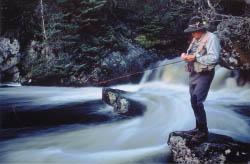Editorial

By Chris Marshall
The last place I expected to find an editorial
on sport fishery conservation was in the pages of
a national newspaper: Nevertheless, there it was on
the editorial page of The National Post on
January 17, 2003, with the title "Investing in Nature."
The writer was responding to a news item on the January
14 auction of 10 year leases for Atlantic salmon fishing
on New Brunswick rivers, acknowledging that "while granting
exclusive access. . .to the private fly fishing lodges
and wealthy anglers who placed the highest bids runs
contrary to the egalitarianism of the age, it is the
surest way to guarantee a revival of the fragile Atlantic
salmon population, and yet another sign that enlightened
self-interest is at least as good a steward of nature and
the environment as the public sector; and sometimes even better."
The writer concludes that "trout streams, old-growth
forests, (and) wetlands have all been saved in the past
ten years because someone was given an entrepreneurial
stake in them. Permit landowners and entrepreneurs to
charge to fish the streams on their property, or conduct
tours through coastal rainforests, and one instantly
creates a vested interest in preserving and maintaining
that natural resource for the long run. Leave all the
natural protection in the hands of the state, on the
other hand, and the result all to often is what economists
describe as 'the tragedy of the commons.' "
It's hard to disagree. I grew up in England, where this
is a common practice, and I have first-hand experience
of private waters there which are invariably better managed
than those that are open to the public. Unfortunately,
this is cold comfort for the majority of fly fishers who
have neither the cash nor the influence to gain access
to private water.
However, there is a middle ground between private and
public management, which provides both good management
and general access, and it can be found here in Canada.
Across the country there are groups, such as Trout
Unlimited, the British Columbia FFF, and various river
associations, comprised mainly of local fly fishers,
which have undertaken the stewardship of sections and
even the entire watersheds of rivers. In most cases,
these rivers are managed as well as those in the hands
of wealthy leaseholders. Moreover, they provide access
to ordinary fly fishers at no or little cost. These
"publically" managed fisheries work for the same reason
that privately managed fisheries work: anglers are
empowered through self-interest. By spending time
with sleeves rolled up to restore degraded channels,
to assist spawning, or to plant streamside vegetation - or
by political lobbying for water quality - participants
acquire a sense of ownership and become fierce defenders
of 'their' streams.
Public management need not be left solely in the hands
of an indifferent and under-funded public service. We
can all become "owners" of our local rivers and lakes
by joining local associations (or creating them where
none exist) and, through partnerships with local and
provincial government, preserve and maintain our
fisheries as effectively, or more so, than private
fisheries managed by and for the wealthy few.
Many fly fishers tend to be solitary, spurning
association with others. Fifty years ago, when
our rivers were less pressured this was an option,
but today it is not. Today, it is essential that
we all assume stewardship. If we do, there need be
no "tragedy of the commons." All we have to do is
get involved. ~ Chris Marshall, Editor Canadian Fly Fisher
Our Man In Canada Archives
|



